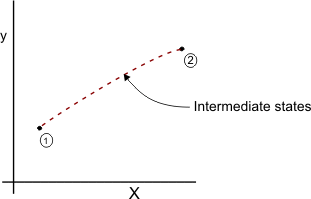Process
In thermodynamics we are mainly concerned with the systems which are in a state of equilibrium. Whenever a system undergoes a change in its condition, from one equilibrium state to another equilibrium state, the system is said to undergo a process.
Consider a certain amount of gas enclosed in a piston-cylinder assembly as our system. Suppose the piston moves under such a condition that the opposing force is always infinitesimally smaller than the force exerted by the gas. The process followed by the system is reversible .
A process is said to be reversible if the system and its surroundings are restored to their respective initial states by reversing the direction of the process. A reversible process has to be quasi-static, but a quasi - static process is not necessarily quasi-static.

Figure 3.2
The process is irreversible if it does not fulfil the criterion of reversibility. Many processes are characterized by the fact that some property of the system remains constant. These processes are:
A process in which the volume remains constant
- constant volume process. Also called isochoric process / isometric process
A process in which the pressure of the system remains constant.
- constant pressure process. Also called isobaric process
A process in which the temperature of the system is constant.
- constant temperature process. Also called isothermal process
A process in which the system is enclosed by adiabatic wall.
|